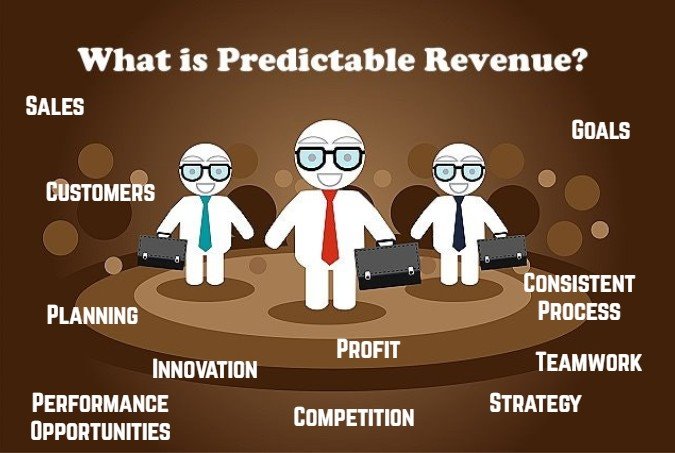
Predictable Revenue Defined
What is Predictable Revenue?
Predictable Revenue is a framework of activities designed to provide consistent sales growth year after year.
Collin Stewart is a podcaster and expert on Predictable Revenue. Collin shared his Predictable Revenue formula:
Consistent Top of Funnel Activity + Consistent Process = Predictable Revenue
 A friend of mine and I talk regularly about the importance of predictable revenue, especially recurring predictable revenue. Building predictable revenue has it’s benefits, including sleeping better at night.
A friend of mine and I talk regularly about the importance of predictable revenue, especially recurring predictable revenue. Building predictable revenue has it’s benefits, including sleeping better at night.
Predictable revenue can come from online sales or by using a dedicated sales team. Or both.
The core idea behind the predictable revenue sales method is that company growth is not based on hiring more salespeople or making them work harder. It’s all about creating a more efficient sales process, through lead generation and a repeatable sales process or sales funnel that will grow the customer base and increase revenue.
Customer Development Research
 I was listening to a sales podcast this morning where the Collin was talking about ‘predictable sales.’ Specifically how to get your first 10 clients – a goal I think many people would embrace. Then, how do you scale that to 100 clients?
I was listening to a sales podcast this morning where the Collin was talking about ‘predictable sales.’ Specifically how to get your first 10 clients – a goal I think many people would embrace. Then, how do you scale that to 100 clients?
His response was to have a very clear goal of who your target prospects are. To really understand them and where they are in life. What keeps them up at night? What is the itch on their back that they can’t scratch? And finally, would these people be a good fit as a client? All good stuff.
Keys to Success
- Running great discovery calls.
- Executing great follow up emails.
- Holding the team accountable to a system.
How Predictable Revenue Drives Sales Growth
Next is product market fit. Making sure your product is the best solution for their needs.
What does your network look like? They come from your existing prospects or customer development process.
Don’t assume you know. Test.
What is the customer’s pain? Don’t scratch your own itch. Drill down to their needs.
Talk to your customer with an open mind. Where are the gaps? Let them shape the direction of the conversation.
Many sales people question why someone would reveal that information. Moreover, they have hubris. “Oh, I know best! I’ve been in this industry…”
No matter your experience or expertise, Ask!
You’re may be embarking on a journey to solve a problem that hasn’t been solved before.
Finding customers. Look for somebody with their hair on fire, desperate to have the fire put out. (WebsiteSuccessGuy blog) Share on XYou want to look for somebody, whose hair is on fire and they don’t know how to put it out. That improves the value proposition for your product.
Don’t create a commodity.
Important to transfer the knowledge that was developed during the research phase to the sales team. Document and share. Sales needs to understand who your best customers are.
Implementing the Predictable Sales Model
There are 3 hypothesis that need to be addressed for a successful predictable revenue or sales model.
 Area of Responsibility
Area of Responsibility
1 Target Hypothesis: Who are the people we’re going after?
2 Need Hypothesis: What’s wrong in their life?
3 Product Hypothesis: How do we solve that for them?
Start with area of responsibility. Who are you selling to? Think of your last 5-10 customers. Who bought from you? What made them ideal? What’s their job title and job description? For more ideas, see Core Desires of Your Target Audience and How to Find Your Perfect Audience.
You can get insights on these Target Personas by looking at job listings. What were they hired to do? What are their goals and KPIs?
- How many new prospects?
- How many new customers?
- How much has profit improved?
In order to hit those goals, what jobs need to be done?
What are they doing to hit those KPI?
What obstacles do they face? How can you alleviate them?
It begins with building a perfect list of prospects. Test lead sources and targeting criteria.
Learn about the company they work for; the role they play, their responsibilities and challenges.
Filter out the perfect or ideal client.
The Predictable Revenue Sales Method
Most larger firms will dedicate 3 or 4 different role players into the predictable revenue sales method.
An Argument for Specialized Sales Teams
 One key member of the team works on lead generation, qualifying the best prospects to turn over to a sales prospector who makes cold calls or engages them online. Then, an account executive works to close the sale before turning the customer over to an account manager or customer service representative.
One key member of the team works on lead generation, qualifying the best prospects to turn over to a sales prospector who makes cold calls or engages them online. Then, an account executive works to close the sale before turning the customer over to an account manager or customer service representative.
Some SMBs combine these jobs. It’s best to have one person in each role and you can move people up as they gain experience and expertise.
The business model will dictate the make-up of the sales team.
For small brands and bloggers, one person may be wearing 4 hats. That’s OK as long as you develop a consistent, measurable approach. Building a predictable revenue generator will require you to manage the time, cost and resources needed for customer acquisition.

7 Predictable Revenue Hacks to Grown Your Sales
1 Focus of Lead Generation: Develop a system geared towards your most coveted prospects the ones who most resemble your ideal past customers. Sales growth comes from lead growth.
2 Reach Out and Engage Prospects: Sales is a numbers game and it’s not just about touching more people, it’s about touching people more often. I hosted a Meetup with a sales consultant who pointed out that most sales people give up after 1-3 conversations, but most sales came after 5-8 (or more) touches.
3 Simplify: Make your outreach easy to absorb. Avoid jargon. Talk about what’s in it for them. And remember, “Features tell, benefits sell.”
4 Know Your Numbers: Track, evaluate and adjust your KPIs. How many sales leads to you get every week? What specific actions influenced that? Notice standard ratios, such as how many calls result in how many sales. For website owners, monitor your Google Analytics. How many visitors, visits, pageviews did you get? Where is your traffic coming from?
5 Plan Your Day: You need to understand what efforts produced what results. Do you need to spend more time planning first thing in the morning? Are you spending enough time reaching out? Are you reaching out at the right times? How much time do you soend closing? How much time to you spend on account management and follow-up.
6 Always Be Testing: Many successful marketers split-test everything, including headlines, email subject lines, sales pages, direct mail pieces, social media. Test all templates, checklists and scripts. Always try to beat your bogey.
7 Monitor and Revise Your Funnels: What mix of email marketing, phone calls, one-on-one meetings or LinkedIn connection requests result in the sale?
Rinse and repeat.
Soon you’ll know who to target and how, when to reach out and how and what to say. Don’t just wing it!
More tips here! How to Succeed in Business.


